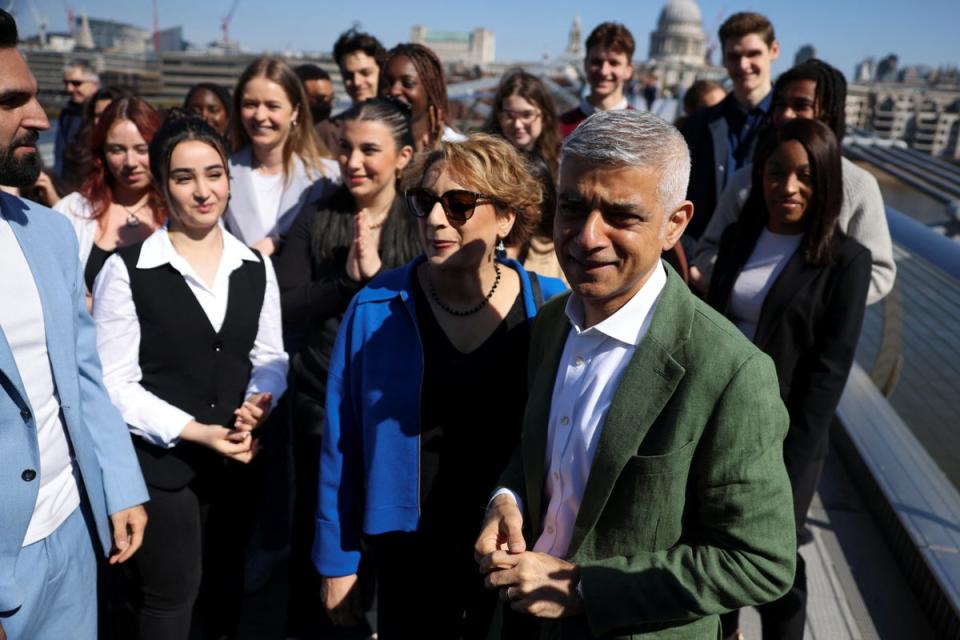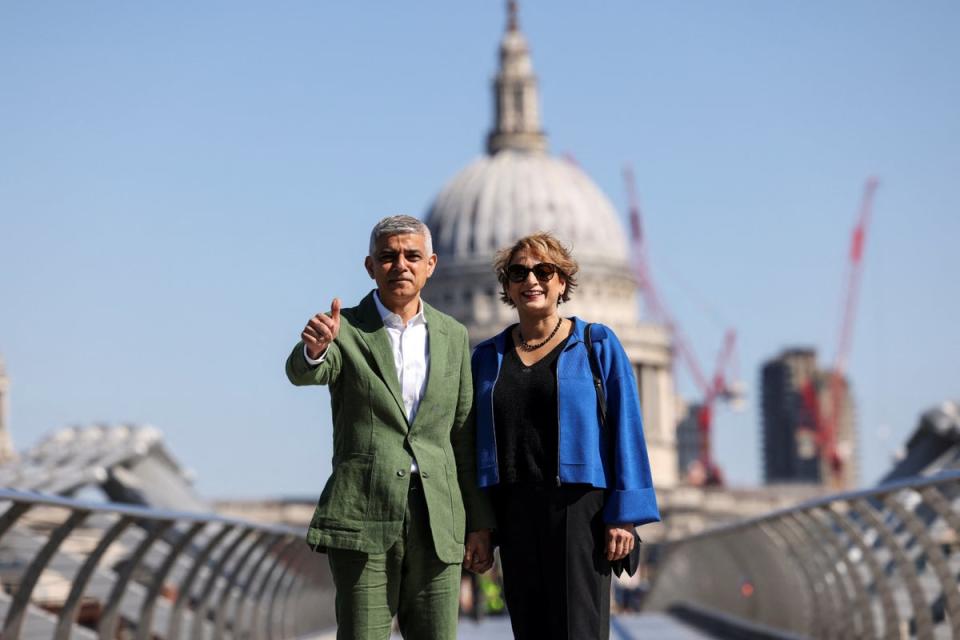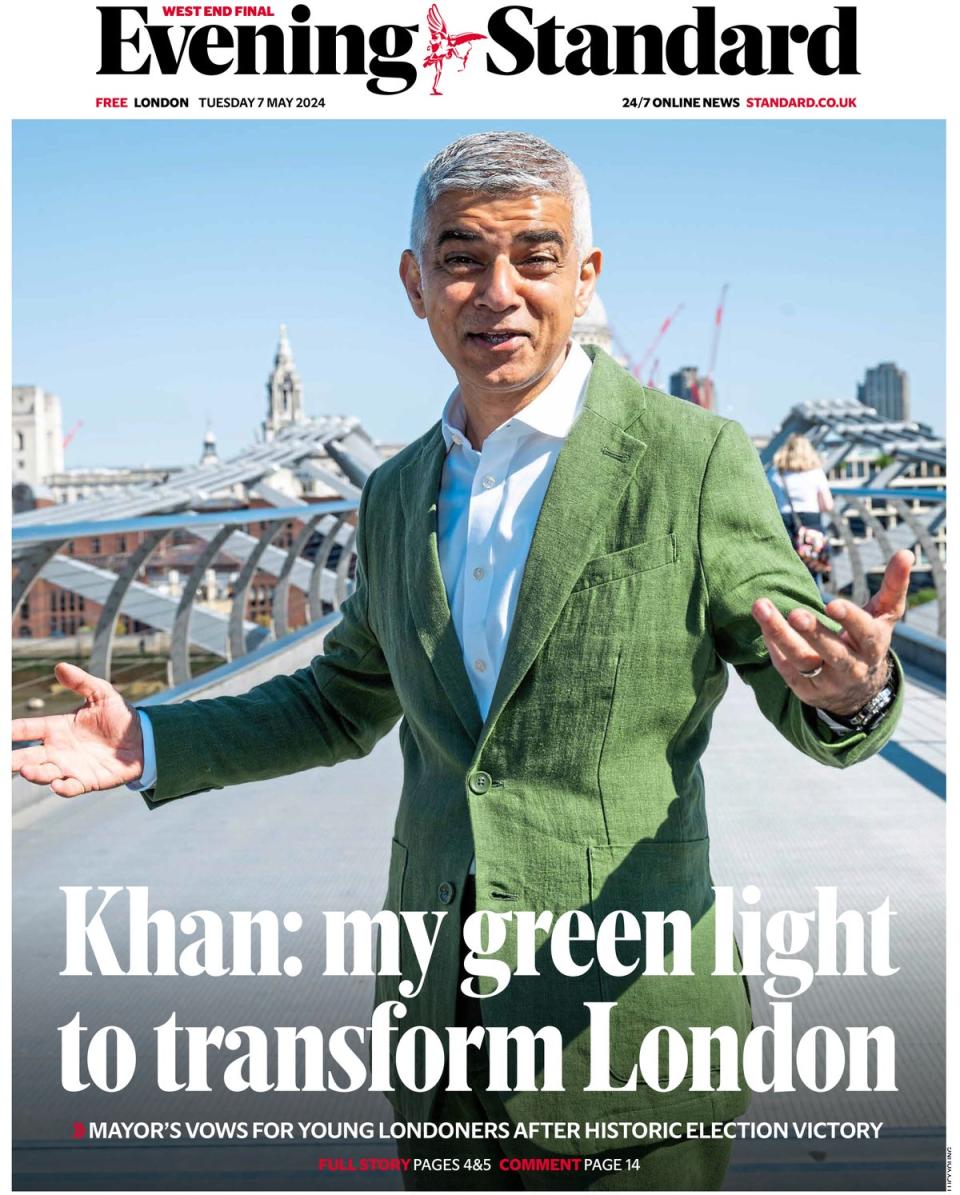Sadiq Khan: My green light to transform London
Sadiq Khan has vowed to improve the lives of young Londoners as he officially signed in for a third term as Mayor.
He said his next four years would focus on “giving the next generation a chance”, from providing free school meals to primary school pupils to increasing the supply of affordable homes.
Speaking at the “declaration of office” at Tate Modern on Tuesday, Mr Khan said he was “acutely aware that these are challenging times and that there’s more to do in every direction”.
He said: “What I’m thinking about is the first 30 days, the first 100 days. We have got a plan. We are going to hit the ground running.”
He played down the historical significance of having claimed a third victory on Saturday — no other mayor has achieved this since the Greater London Authority was formed in 2000 — by saying his priority was getting on with the job. However, he dismissed suggestions by Rishi Sunak that the next general election was likely to result in a hung parliament.
Mr Khan said the scale of his re-election as Mayor meant the Prime Minister was deluded to believe the country was not set for a Labour victory.
In his first interview since Saturday’s comprehensive trouncing of Tory rival Susan Hall, Mr Khan told the Standard: “I think Rishi Sunak should consider giving evidence to our [City Hall] commission on the consequences of smoking cannabis, because he is clearly on something.”
Asked what the mayoral result — which saw a 3.2 per cent swing from the Tories to Labour across the capital, would mean for Conservative MPs in London, he said it was a vindication of his eight years as Mayor.

“We had gains in inner London and outer London, but it’s also recognition that Londoners are desperate for a change in government,” he said. He arrived wearing a new green linen suit tailored for him by Percival in Hackney, and by Francesco’s in Berwick Street, Soho.
“They said to me: ‘It’s quite clear you are the green Mayor — why don’t you dress like one?’ So here I am.” He celebrated victory by visiting his mother, whom he said had been unwell, and joined an “amazing” party at Canary Wharf with Labour supporters on Saturday night.
But he refused to be drawn on suggestions that the scale of his win might mean him seeking to stay in office beyond 2028 — though neither did he rule this out. Asked how long he might remain, he said: “It’s not about thinking about the next election — it’s about what we can deliver for our city. One of the things I am determined to do is make sure London is a byword for opportunity.
“One of the things I have reflected on is my life journey, and today’s young Londoners may not be able to fulfil their potential. It’s not about thinking about the next election — it’s about what we can do over the next four years.
“There is the really exciting prospect of having a Labour government to work with. I think working with a Labour government can be transformative.”
Mr Khan polled 1,088,225 votes to 812,397 for his Tory rival Ms Hall, a 275,828 majority. It was the second-largest winning gap in the history of the London mayoralty, surpassed only by his first victory in 2016, when a two-vote system was in use.
His share of the vote increased from 40 per cent to 44, while Ms Hall, whom he criticised for a “campaign of non-stop negativity”, polled 32.7 per cent, down 80,000 votes on the previous Tory mayoral candidate Shaun Bailey, who claimed 35.5 per cent of votes.

There was a 3.2 per cent swing from the Tories to Labour. Election experts said the supposed controversy around last year’s Ulez expansion, which the Tories hoped would harm Mr Khan, was “the dog that didn’t bite”.
Mr Khan said: “Londoners said no to division, no to hate and yes once again to diversity, unity and hope. London is now a beacon — not just for climate action, but for openness, inclusion and equality across the world.” He said the cost-of-living crisis meant Londoners were being priced out of the city, with the odds “increasingly stacked against a bus driver’s son, or a nurse’s daughter”. He said: “That’s why my third term will be about pulling out all the stops to give them the best possible chance of success here in our city.”
This would range from making free school meals permanent to “keeping the daily commute more affordable”.
He added: “Over the next four years, City Hall will provide that vital helping hand young Londoners need to move forwards and achieve their aspirations. I’m pledging to help make London the best city in the world to grow up in, working directly with young people to help develop new and innovative policies to support them from birth, to feeling safe, securing a job and finding an affordable home. We need to give the next generation a chance.”
He vowed to “go even further” with action on clean air, including a “100 per cent zero emission bus fleet by 2030” — though this will require substantial government investment. Mr Khan said: “We’ll also continue planting more trees and clean up our rivers — including the Thames – in the same way we’ve cleaned up our air.” The first official analysis of the London-wide Ulez, in terms of what impact it has had on tackling toxic air, is due imminently.

On the eve of polling day, Mr Khan had predicted a “very close two-horse race”. But once he out-polled Ms Hall in former Tory strongholds such as Westminster and Kensington and Chelsea, victory was never in doubt.
Almost 2.5 million Londoners cast a ballot. Turnout was down from 42 per cent to 40.5 per cent.
The Electoral Reform Society said the switch to traditional first-past-the-post meant Mr Khan received the “smallest mandate” from Londoners of any mayor since the post was created 24 years ago.
Under the previous supplementary vote system, more Londoners voted for the victorious candidate, either with a first preference or second preference vote. Prior to the 2024 election, the Mayor who had received the lowest total support from Londoners was Ken Livingstone in 2004, when he won 44.4 per cent of votes cast.
The Tories also lost one of their seats on the London Assembly, the cross-party body that scrutinises the Mayor. Labour remained the largest party with 11 of the 25 seats, with the Tories on eight, the Greens on three and the Lib-Dems on two. The anti-Ulez Reform party won a seat for the first time. Ms Hall was re-elected as an assembly member.
Rob Blackie seized third place for the Lib-Dems, polling 70 votes more than Green candidate Zoe Garbett.


